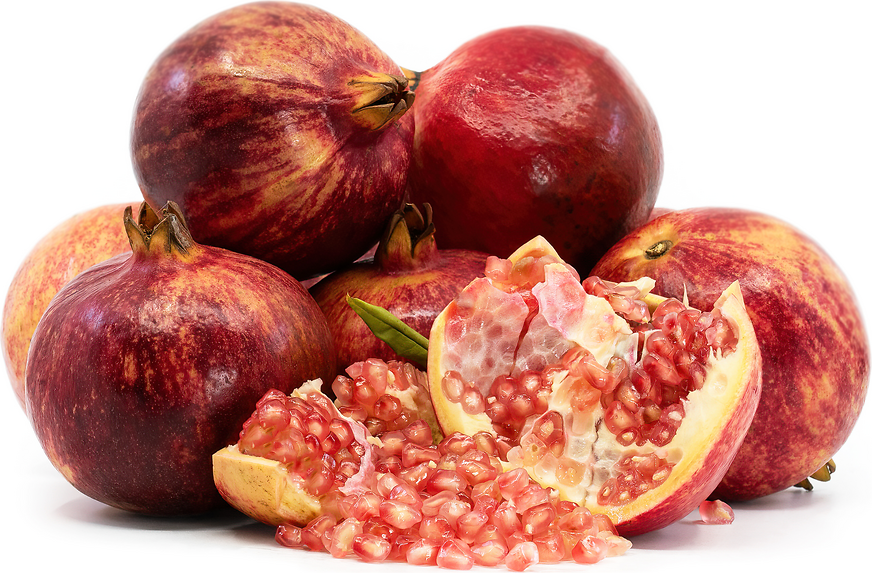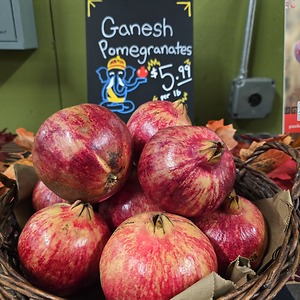


Ganesh Pomegranates
Estimated Inventory, lb : 0
This item was last sold on : 12/06/24
Description/Taste
Ganesh pomegranates are a medium to large varietal, averaging 5 to 12 centimeters in diameter, and have a round, oval, oblate shape with one protruding crown-like end known as the calyx. The variety’s rind is smooth, taut, glossy, and firm, showcasing variegated and striped pink, red, and yellow hues. The rind is tough, leathery, and thick but can be broken open by hand once partially cut. As the fruit is opened, several chambers of fleshy arils appear encased in white, mildly bitter membranes. The membrane is spongy, chewy, and slightly fibrous. The arils are oval to oblong and have a translucent, pink, and red appearance. When consumed, the arils have an initial burst of juice followed by a soft and crunchy consistency due to a tiny interior seed embedded in the flesh. A pomegranate can contain anywhere from 300 to 700 arils and the fruits are consumed ripe. Ganesh pomegranates should feel heavy for their size and have a glossy nature. The fruits do not continue to ripen off the tree and are ready for consumption immediately after purchase. Ganesh pomegranates are known for their sweet, tangy, and refreshing flavor.
Seasons/Availability
Ganesh pomegranates are available year-round in India, with each region exhibiting varying ripening times. In more temperate climates, the variety can be found in the fall through mid-winter.
Current Facts
Ganesh pomegranates, botanically classified as Punica granatum, are an Indian variety belonging to the Lythraceae family. The fruits grow on spreading, evergreen trees, and each tree produces around 8 to 10 kilograms of fruit per season. Ganesh pomegranates are a commercial variety in India and are favored for their sweet and sour flavor, soft arils, extended shelf life, and adaptability. The variety was once the dominant cultivar grown for retail markets in the mid to late 20th century, but over time, cultivation has reduced with the rise of other newer, improved varieties. Ganesh pomegranates are also known as Ganesh Red, Ganesh Bhagwa, and GBG-1. The variety is sold fresh in commercial markets and has remained a historically significant variety in India and for use in religious, medicinal, and culinary practices.
Nutritional Value
Ganesh pomegranates have not been extensively studied for their nutritional properties. Pomegranates, in general, are mentioned in Ayurvedic texts in India as a natural remedy with antioxidant and anti-inflammatory properties. Pomegranates are utilized in various medicinal syrups, juices, and decoctions and are a source of vitamin C, vitamin K, potassium, folate, fiber, and copper. Vitamin C strengthens the immune system, while vitamin K assists the blood in coagulating at a faster rate for improved wound healing. Potassium replenishes electrolytes in the body while balancing fluid levels, folate develops tissues, fiber regulates the digestive tract, and copper helps the body produce red blood cells. Pomegranates also provide lower amounts of Iron, vitamin E, magnesium, phosphorus, zinc, manganese, riboflavin, and thiamin. Iron develops the protein hemoglobin for oxygen transport through the bloodstream, vitamin E guards the cells against the damage caused by free radicals, and magnesium controls everyday nerve functions. Phosphorus supports bone and teeth production, zinc helps the immune system against bacteria, and manganese develops connective tissues.
Applications
Ganesh pomegranates have a sweet and sour flavor suited for fresh and cooked preparations. The variety is primarily consumed fresh, out of hand, and the arils can be separated and eaten or eaten with portions of the white membrane. It is worth noting that the white membrane has a mildly bitter taste, and discretion and discussion with a doctor should be conducted before consuming the membrane. In India, pomegranate membranes are viewed as having medicinal benefits. Ganesh pomegranate arils are eaten as a stand-alone snack, or they are sprinkled into green salads and fruit medleys, including kachumber, an Indian salad comprised of herbs, tomatoes, cucumbers, onions, and spices. Ganesh pomegranates can also be added to yogurt, oatmeal, cous cous, and other grain dishes for added coloring, texture, and flavoring, or they can be dipped in chocolate and tossed with nuts as a savory-sweet snack. Outside India, Ganesh pomegranates are popularly incorporated as decoration or folded into batters for bread, cupcakes, cookies, and muffins. They are also used in variations of cheesecake or blended and frozen into gelato and sorbet. In addition to sweet dishes, Ganesh pomegranates are cooked into savory sauces, chutney, or added to spreads and dips such as hummus, salsa, raita, and guacamole. The arils can also be added to chaats, which are savory Indian snacks and used as an edible garnish over vegetable and meat dishes. Beyond culinary dishes, pomegranate arils can be juiced and stirred into sparkling beverages, fruit juices, cocktails, shakes, and other drinks. In India, kokum sharbat is a well-known refreshing beverage commonly served on warm days. Ganesh pomegranates pair well with fruits such as apples, persimmons, pears, and strawberries, squash, pumpkin, cauliflower, herbs such as parsley, rosemary, basil, mint, and cilantro, and nuts such as walnuts, pecans, almonds, and pistachios. Whole, unopened Ganesh pomegranates will keep for several weeks when stored in the refrigerator. Once the arils are extracted, they can be placed in a sealed container in the fridge, where they will keep for 1 to 2 weeks. Pomegranate arils can also be frozen for extended use.
Ethnic/Cultural Info
Ganesh pomegranates were named after the famous Hindu deity of the same name and are deeply intertwined into Hindu mythology and religious practices throughout India. Lord Ganesh is the god of wisdom, protection, blessings, and the remover of obstacles. The name Ganesh, also written as Ganesha, is derived from the Sanskrit words “gana,” meaning “people,” and “isha,” meaning “lord.” Lord Ganesh is often referred to as “lord of the people” and is one of the central gods within the Hindu religion to help with major life events. It is said that Lord Ganesh also loves pomegranates, and the fruits are symbols of prosperity, abundance, and health. Pomegranates are often placed in households in India as an offering to Ganesh, and the fruits are believed to welcome good fortune and blessings from the deity. Pomegranates are also used during Ganesh Chaturthi, an annual celebration of Ganesh’s birth. The ten-day festival features several practices, rituals, and community events, and fruits, including pomegranates, are included in daily fruit offerings to Ganesh as a symbol of thanks and abundance.
Geography/History
Ganesh pomegranates are native to India and were developed in the mid-20th century. The variety was bred at the Ganeshkhind Fruit Experiment Station in Pune City in the state of Maharashtra, India, and was created by Dr. G.S. Cheema, a famous breeder and scientist nicknamed the Father of Indian Horticulture. In 1932, Dr. Cheema selected a local, wild type of pomegranate called Alandi and bred the variety for improved characteristics. Open-pollinated seedlings were chosen from these crossings, and in 1936, one of the seedlings, GBG-1, was released for commercial cultivation in Maharashtra. After its release, GBG-1 was renamed Ganesh as a moniker to attract consumer attention in commercial markets. Ganesh pomegranates were favored in commercial markets in India as the variety had softer arils and a balanced, sweet, and sour flavor, which was distinct from other varieties available in markets at the time in the late 20th century. Ganesh pomegranates eventually became one of the most popular varieties in India and remained a major cultivar up until the 1950s. At the end of the 20th century and in the early 21st century, new and improved pomegranate varieties were being released in India, overshadowing Ganesh pomegranates. The Ganesh cultivar was also used to breed many of these new varieties, contributing to their attractive characteristics. Today, Ganesh pomegranates are still commercially grown in India and are cultivated as a fruit sold domestically and internationally. Pomegranates are commercially cultivated in the Indian states of Maharashtra, Gujarat, and Andhra Pradesh. They are also grown in smaller quantities in Haryana, Tamil Nadu, Punjab, Karnataka, Himachal Pradesh, and Rajasthan. The fruits are seen in local markets throughout India and are exported to countries including the United Kingdom, the United Arab Emirates, Oman, Kuwait, Bahrain, the Netherlands, Canada, and the United States. Ganesh pomegranates are also cultivated in smaller quantities worldwide and are sold as a specialty variety.








